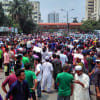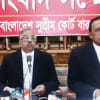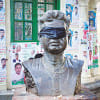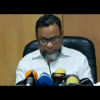Hauling of Quota Leaders: DB's version at odds with witnesses'
Witnesses' accounts to Monday's incident involving three quota reform movement leaders contradict detectives' version that the trio were called in at their office to assist investigators in identifying the attackers of DU VC's residence.
Joint Commissioner of Detective Branch Abdul Baten yesterday said, “The three leaders were called in for assistance, not to assault or dishonour them.”
They were not wanted and the police did not find any direct connection between them and the attack, he said in response to reporters' queries at a briefing on arrest of a fraud gang at DMP media centre.
The quota movement leaders allege that some people wielding revolvers and identifying themselves as detectives dragged them inside a microbus.
One of them at a press conference also alleged that they were “blindfolded” and made to wear helmets after the vehicle reached Gulistan.
The Daily Star yesterday talked to five witnesses, whose accounts corroborated the claims of the three quota reform leaders that they were forced into a microbus.
The incident took place in front of some wayside restaurants opposite the emergency gate of Dhaka Medical College Hospital around 1:15pm on Monday.
The witnesses -- hotel staff and customers -- almost similarly said three to four motorcycles first waylaid the rickshaw carrying the three leaders. Several people then held them by their shirt collars and belts.
In an instant they were dragged into the microbus that drove off. The whole episode took less than two minutes, added the witnesses, who refused to be named in fear of future troubles.
The leaders -- Nurulhaq Nur, Muhammad Rashed Khan and Faruk Hasan -- are joint conveners of Bangladesh Sadharan Chhatra Odhikar Sangrakkhan Parishad, a platform of students who had been demonstrating for reforms in the country's quota system in civil service.
Nurul is a master's student of English at Dhaka University. Rashed and Faruk are former students of the same university's banking and insurance department and Institute of Disaster Management and Vulnerability Studies respectively.
Joint Commissioner Baten claimed the allegation of picking up the three protesters and blindfolding them was not right.
He said they called in the trio to identify the attackers of DU vice-chancellor's residence from video clips and photographs they have collected from the scene.
He added as they were the leaders of the movement and wanted the attackers to be tried, police assumed that their investigation would get pace if they could identify any of the attackers.
“This was the purpose, but maybe there was some misunderstanding,” he said.
Nur Mohammad, former Inspector General of Police (IGP), told The Daily Star that law enforcers could bring anyone to interrogate for the sake of investigation.
A scary situation has been created lately due to picking up people from the streets abruptly. So, police should show their identity cards before detaining or arresting anyone, he added.
He also said police have no right to hurt anyone's fundamental rights and the people concerned should be taken for interrogation or detained with due respect.
In any particular case, if any excess is done by the police, an inquiry could be done, the former IGP suggested.
Nur Khan Liton, a rights activist, said the existing law does not support such police behaviour of picking up someone from the middle of the road.
It is totally an act of police's illegal step and it is unlawful, he added.
The way the three students of DU described the incident, there is no chance to disbelieve them, said Liton, adding that it is a state violation of human rights.

 For all latest news, follow The Daily Star's Google News channel.
For all latest news, follow The Daily Star's Google News channel. 







Comments